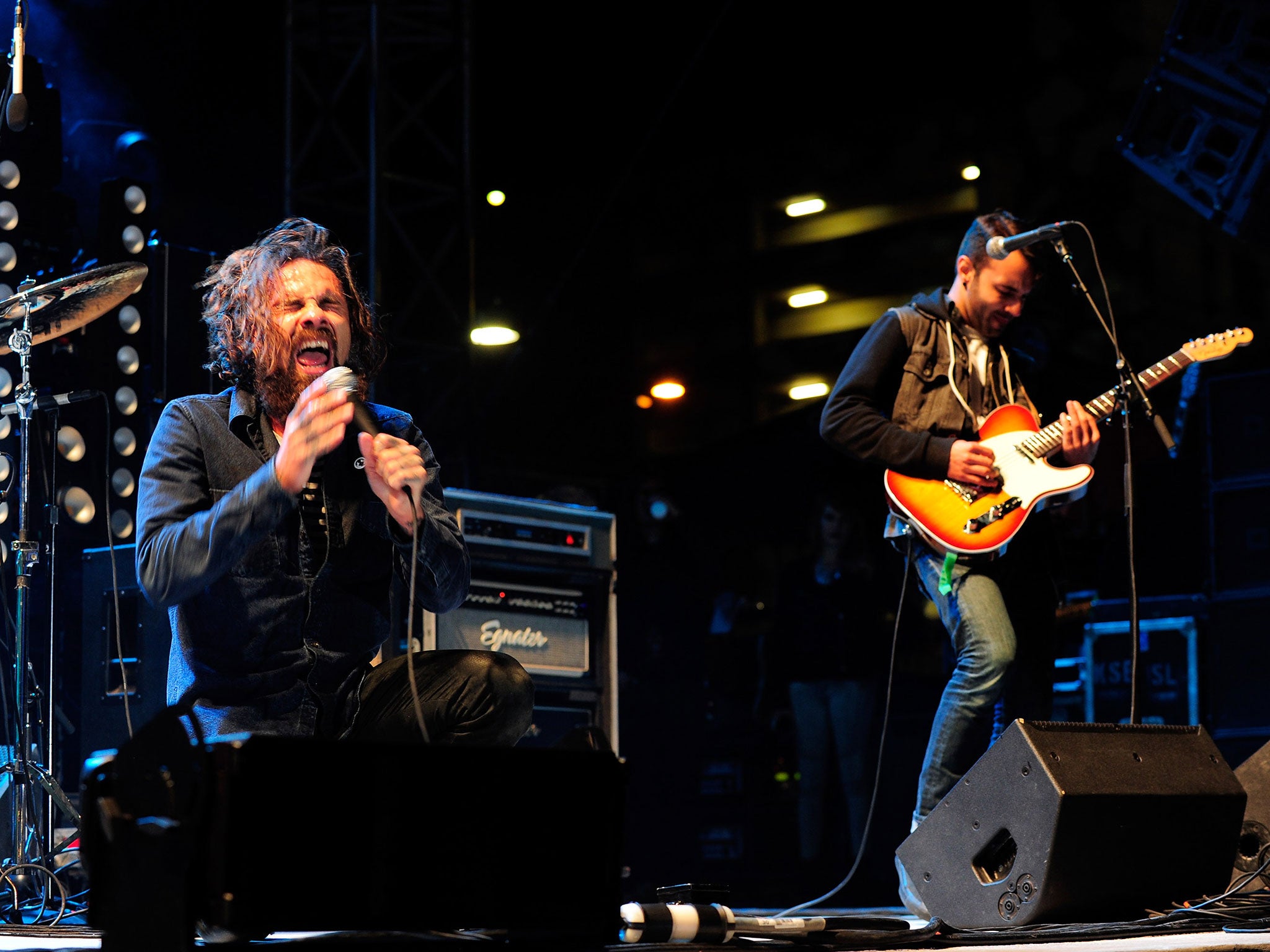Letlive. interview with Jason Aalon Butler: ‘Rock music was birthed in heresy and rebellion’
The prodigious frontman with the LA soul punks discusses their new musical direction and modern punk music’s uneasy relationship with politics

Harnessing the severe, frenetic power of Black Flag and marrying it to the melodic, infectious soul of Michael Jackson has made letlive. one of the most thrilling propositions in contemporary music. Their break-through album, 2010’s Fake History, was a raw, un-sanitised, detonation in modern punk rock, which transcended the work of even their greatest contemporaries. On 10th June, letlive. are set to explode all over again with the release of If I’m the Devil, one of the most intelligently crafted albums of 2016. Unconcerned with scenes or trends and sonically brighter than the band’s previous work, If I’m the Devil is no less intense, providing a vitriolic polemic on the injustices of modern society. In frontman Jason Aalon Butler, they have one of the most astute and verbose frontmen in modern rock history and If I’m the Devil contains some of his most seething admonishments against the abuse of power yet.
As with the band’s previous record, 2013’s The Blackest Beautiful, letlive. have radically re-developed their sound, a symptom of their ambition to constantly evolve, but the process of developing that new sound saw tensions within the band reach a peak. ‘We weren't able to agree on a sound between the four of us for a long time’ says Jason. ‘We were at our worst point creatively that we'd ever been as a band. We set the bar high and everything needed to be approved by everybody else. Eventually we had to become very transparent with each other and just say 'look, I just don't like this' or 'this isn't working for me.' I said that plenty of times and so did everybody else. We wrote for about a year on and off and tensions were running high throughout, but by the time we were recording we were all excited about the songs. We were finally really happy and actually really proud of it, but it took a long time for us to figure that out.’
Creative tensions are nothing new of course, in fact many of modern music history’s greatest albums had difficult births, and If I’m the Devil continues this tradition, being the most uniquely letlive. record to date. Jason is very candid about the struggles the band had to endure in order to write this material. ‘Here's the thing about being in a band man ... you have to be emotionally available to the people you're writing with. You have to trust them and I think that we learned a lot about trusting each other and being available and honest with each other in this process. I know for a fact that I was difficult to work with because I always want more and sometimes different people’s ideas of more are disparate. I don't think any of us should feel bad about wanting the music to be the best it can be, but we needed to figure out how to get there as a unit. And I’m glad to say we did, because if we hadn't, the record probably wouldn't have come out.’
The lyrical themes explored on If I’m the Devil are vast, with Jason providing articulate commentary on socio-political issues throughout. The album’s first single, Good Mourning America, is a striking call-to-arms against excessive use of police force in America towards ethnic minorities, an issue sadly all too familiar to Jason. Partly inspired by the Ferguson unrest that began in August 2014 after the fatal shooting of African-American Michael Brown by a white police officer, the song is an exhilarating rallying cry as well as being an incredibly bold statement of intent from the record. But Jason’s own relationship with the police is complex. ‘My brother’s a cop and I have this sense of ambivalence towards his profession. He’s one of maybe five people I can count on my hand who’ve had a positive effect on my life. I trust him as a police officer and I trust him as my brother but it's not mutually exclusive with the fact that if authority mistreats me or those around me, I will fight it. I don't care if my brother's a cop, wrong is wrong to me and it always will be wrong.’
Now that technology has granted us the ability to record injustices to our phones and upload the footage to social media, awareness of issues like excessive police brutality is becoming more wide-spread than ever. Given rock music’s deep-rooted history in literally raging against the machine, there should be an absolute deluge of angry, politicised music in 2016. Some artists are still willing to speak out but considering the unsettling times in which we now live, it’s surprising that more bands aren’t speaking out about socio-political issues. ‘Rock music was birthed in heresy and rebellion,’ says Jason ‘from blues to jazz to chain-gangs, dissent is at the heart of rock music. I wish that people would at least respect that heritage. I care about rebellion, I care about subversion, I care about progress and I think that bands are afraid to speak out for a very simple reason; how many bands really see 'success' from being abrasive or being oppositional? Not many! I think that there's a self-interest, there's this huge self-serving element to being a musician. Musicians crave attention whether we want to admit it or not. I don't just mean ‘the limelight’, I mean primitively, in our DNA. There is a part of us that plays music to attract someone, either for procreation or to keep us safe, and I've been trying to remove that part of myself, to diminish the ego. I don't want to indulge that anymore.’
So what does Jason want to indulge with letlive. in 2016? ‘I want to indulge the art and the feeling, I want to feel comfortable and I want to feel creative. I’m not reticent to say anything that's going to make people feel upset about the current state of affairs. I don't care! I just don't. People are being subjugated, people are being marginalised, they're being disenfranchised and they're being under-represented. People are dead, people are no longer breathing and six feet under because of the issues that I'm talking about, so I feel duty-bound to discuss them.’

Jason’s rhetoric shows a deep understanding of America’s history, a theme that is prominent through-out letlive.’s work. Though it should be made clear that he is proud to call himself American, Jason’s not afraid to criticise the systems in place that continue to make the rich get richer and the poor get poorer. ‘There’s this weird sense of guilt that society has imposed on people because they may share phenotypical qualities with those in power; maybe you're from a nicer area or your skin-tone is a little lighter than mine. There’s this term for it in America, ‘white guilt’ and I don't think that people should feel guilty! It's not about that, it's about being aware that there are polices in place that allow power to be utilised in a way that is at a disadvantage to certain people. For centuries, in various cultures, darker skin folk have been exploited. In America, our forefathers wrote books stating that black people were three-fifths a man so that they could place a value upon them in order to sell them as a commodity and therefore they did not earn the same rights as people with fairer skin. That's just the reality, and I think that, as Americans, we need to understand that our country was built upon the backs of slaves. It was built upon plunder and in order to benefit a very concentrated group of people and that stone in the ocean has caused a ripple that’s still being felt today.’
If I’m the Devil doesn’t only concern itself with the political, with Jason experiencing profound changes in his personal life. In September 2014, he proposed to New-Zealand born singer-songwriter Gin Wigmore. They got married at a private ceremony in Hawaii the next day. ‘I met this woman who changed my life’ he says. ‘I used to think that love wasn’t for me, but now I feel 100% committed and invested in feeling the most immense amounts of joy and pain, all because of one person. I used to think I'm not afraid of anything and I would seek out dangerous scenarios to prove that to myself. But I realised I was experiencing an emotional vacancy because, simply put, I was afraid of being hurt. I was apprehensive about opening myself up fully to one person because I thought it might be too much for them to deal with. But Gin stuck around and I’m much easier to deal with now because of that. I’m not afraid like I used to be anymore.’
This fearlessness has permeated through letlive’s music as well, enriching it even beyond the already expansive pool of influences the band have utilised in the past. If I’m the Devil is the sound of a band who have cultivated their sound into the perfect distillation of melodicism and subversion; a form of revolutionary counterculture music that is unafraid to stand-up and be heard. It’s the perfect soundtrack to the idea behind letlive., which Jason says has remained unchanged since he formed the band when he was 16 years old. ‘Ultimately, it’s about liberating oneself. I want people to feel free because once you find freedom for yourself, you're able to offer it to other people. I want people to be ok with who they are and help create an environment that nurtures that and that’s what letlive. is.’
Enjoy unlimited access to 100 million ad-free songs and podcasts with Amazon Music
Sign up now for a 30-day free trial. Terms apply.
ADVERTISEMENT. If you sign up to this service we will earn commission. This revenue helps to fund journalism across The Independent.
Enjoy unlimited access to 100 million ad-free songs and podcasts with Amazon Music
Sign up now for a 30-day free trial. Terms apply.
ADVERTISEMENT. If you sign up to this service we will earn commission. This revenue helps to fund journalism across The Independent.
'If I’m the Devil' is released via Epitaph on 10th June. Letlive. start a US tour in Los Angeles on 14th June.
Join our commenting forum
Join thought-provoking conversations, follow other Independent readers and see their replies
Comments